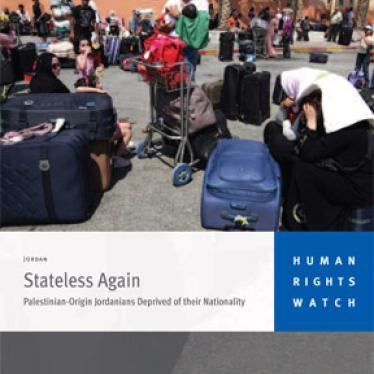Jordan's leaders claim that they withdraw nationality from citizens of West Bank origin to counter Israeli designs of colonizing the West Bank: these now-stateless former Jordanians can somehow more easily be returned as nationals of a future Palestinian state. But Jordan's talk of supporting Palestinian national interests only serves to deflect from its domestic demographic interests.
Jordan broadcasts its support for Palestinian nationhood loudest when trying to deflect from its own violations against the rights of Jordanian citizens of Palestinian origin. In a February report, Stateless Again, Human Rights Watch documented how, for years, Jordanian officials' arbitrarily stripped nationality from Palestinian-origin citizens. In response, government spokesperson Nabil al-Sharif said that this was "necessary [in order] for a Palestinian to hold onto his land," and to "stop [Israeli] plans to empty the West Bank of its population and to Judaize it."
Between 2004 and 2008, Jordan rendered more than 2,700 Jordanians of Palestinian origin stateless, often leaving these truck drivers, doctors, and engineers who had led settled lives fearing for their jobs, equal access to education and health care, freedom of travel, and the ability to own property. As stateless persons, these former Jordanians have lost not only the right to vote in Jordan, but their social and economic security, too.
Jordan argues that its "adjustment of circumstances" does not amount to a withdrawal of nationality. But as Human Rights Watch has documented, the results are the same, and the political posturing over Palestinian national rights is disingenuous, dangerous, and wrong. It is disingenuous, because officials have been unable to explain how withdrawing nationality helps Palestinians preserve their identity or establish a state. Israeli restrictions typically prevent these newly stateless former Jordanians from moving to the West Bank. They and their Jordanian-born children, who suffer the same fate, have lived in Jordan for decades. Many have never visited their ancestral West Bank homes.
A more likely reason for Jordan's actions is its desire to send Palestinian-origin citizens, more than half Jordan's total population of 6.3 million, back into Israel or a putative future Palestinian state under the right of return. At least that is what an interior ministry official indicated in July 2009. The prospect of fewer Palestinian-origin Jordanians plays to the gallery of "original" Jordanians contending for greater demographic weight. But it is patently unfair-and a violation of basic human rights- to arbitrarily strip away nationality and uproot Palestinian-origin Jordanians today in order to make them more "returnable" in the future.
Altering Jordan's demographic make-up at the expense of Palestinian-origin citizens is a dangerous precedent for any Jordanian. Jordan accepted hundreds of thousands of Palestinian refugees, in 1949, and again in 1967, granting most citizenship. In 1950 Jordan had annexed the West Bank, but in 1988 King Hussein announced that Jordan would "disengage," cutting all administrative and legal ties with the territory. All West Bank residents were to be stripped of their Jordanian nationality, but the remaining "Jordanian citizens of Palestinian origin...have the full rights of citizenship and all its obligations, the same as any other citizen irrespective of his origin," the king declared. In 1991, Kuwait expelled two hundred thousand Palestinian-origin Jordanians, who typically moved there before the 1988 disengagement, following Iraq's invasion. It is chiefly these Jordanians who now risk losing their Jordanian nationality, two decades after their return.
Jordan's current practices are a harsh reversal of its former generosity and go beyond the disengagement decision. In doing so, they are wrong, violating Jordanian and international law. International law urges states to reduce statelessness, not to withdraw nationality if doing so would render a person stateless, and to treat stateless persons equal to citizens in social and economic rights. Yet Jordan is turning citizens into stateless persons, while denying them equal social and economic rights. Violations of Jordanian law undermine the trust in Jordan as a country that respects the rule of law.
Moreover, nothing in Jordanian law allows for the current practice of withdrawal of nationality. Under Jordan's law of nationality, only entering the "service of an enemy state", the "military," or the "civil service of a foreign state" qualifies for withdrawal. Palestine is not a sovereign state that can bestow nationality, a fact the prime ministry and foreign ministry readily acknowledge-although interior ministry officials tried to justify their practices to Human Rights Watch by claiming that Palestine was a state and that some Jordanians worked for the Palestinian Authority. Another claim put forward was that Jordanian law and Arab League decisions prohibit dual Arab nationality, making it impossible to hold both Palestinian and Jordanian documents. In fact, Jordanian law expressly permits dual nationality, and later Arab League decisions supersede earlier ones prohibiting dual Arab nationality.
In the majority of cases, the interior ministry has withdrawn nationality because of the failure of Palestinian-origin Jordanians to renew or obtain an Israeli-issued residency permit for the West Bank. Jordanian law does not condition nationality on Israeli procedures. Many of those who tried to obtain or renew such permits failed through no fault of their own. Israel has imposed ever-changing conditions for obtaining a residency permit, and only grants such permits to persons included in its 1967 West Bank census that left out all those who had fled to Jordan that year, and to their direct descendants.
Jordan should not pursue aspirations for Palestinian statehood on the backs of people it once welcomed as equal citizens, but whose demographic weight it now fears.
Christoph Wilcke is a Middle East researcher for Human Rights Watch







